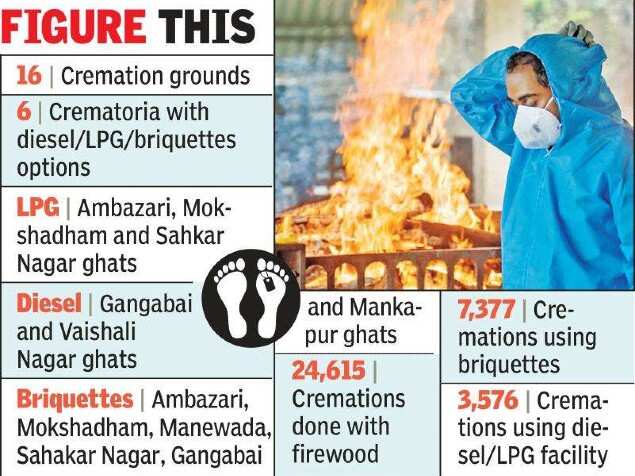- News
- City News
- nagpur News
- Only 30% cremations done with eco-friendly options in 14 months: Nagpur
Only 30% cremations done with eco-friendly options in 14 months: Nagpur

Representative image
NAGPUR: A majority of families in the city still opt for traditional firewood cremations over eco-friendly last rites. Of the 16 crematoriums in the city, six have LPG, diesel and briquette facility for performing the last rites.
Data procured from Nagpur Municipal Corporation (NMC) revealed that the city used 73.85 lakh kg firewood for cremations from April 1, 2020 to May 31, 2021. The data also points towards lack of awareness about the eco-friendly cremation as only 30% opted for it.

In the last 14 months, 35,568 bodies were cremated at 15 ghats. Firewood was used to cremate 24,615 bodies while briquettes were preferred for 7,377 last rites. The response to LPG and diesel cremation was very poor. Only 3,576 bodies were cremated by using these eco-friendly facilities.
Data also showed that from April this year, the NMC had started providing firewood too free of cost. Earlier, the civic body used to charge Rs2,500 for providing 300kg firewood. Till the time the civic body charged for firewood, people preferred briquettes or LPG and diesel for cremation. This can be gauged from the fact that 6,375 last rites were performed in April using firewood while eco-friendly options were used for 2,327 cremations. In May, 3,218 bodies were cremated using firewood and 1,282 through eco-friendly methods.
Expressed their concern, environmental activists stated that Nagpur being a developing city, it is fast losing its green cover. “Hence, cremation by agro briquettes or electric or CNG will definitely help in preserving greenery,” said green crusder and team lead Green Vigil Foundation, Surbhi Jaiswal.
Though agro briquettes contribute to air pollution, they have less carbon as well as ash content. “Moreover, it is a waste which is getting utilized. Otherwise, it would have caused other environmental issues,” she said.
“However, one need to address the religious faith which is highly in favour of cremation by firewood. NMC is spending on procuring wood as well as briquettes, hence either both should be available free of cost at crematoriums or both should be charged,” said Jaiswal.
Data procured from Nagpur Municipal Corporation (NMC) revealed that the city used 73.85 lakh kg firewood for cremations from April 1, 2020 to May 31, 2021. The data also points towards lack of awareness about the eco-friendly cremation as only 30% opted for it.

In the last 14 months, 35,568 bodies were cremated at 15 ghats. Firewood was used to cremate 24,615 bodies while briquettes were preferred for 7,377 last rites. The response to LPG and diesel cremation was very poor. Only 3,576 bodies were cremated by using these eco-friendly facilities.
Data also showed that from April this year, the NMC had started providing firewood too free of cost. Earlier, the civic body used to charge Rs2,500 for providing 300kg firewood. Till the time the civic body charged for firewood, people preferred briquettes or LPG and diesel for cremation. This can be gauged from the fact that 6,375 last rites were performed in April using firewood while eco-friendly options were used for 2,327 cremations. In May, 3,218 bodies were cremated using firewood and 1,282 through eco-friendly methods.
Expressed their concern, environmental activists stated that Nagpur being a developing city, it is fast losing its green cover. “Hence, cremation by agro briquettes or electric or CNG will definitely help in preserving greenery,” said green crusder and team lead Green Vigil Foundation, Surbhi Jaiswal.
Though agro briquettes contribute to air pollution, they have less carbon as well as ash content. “Moreover, it is a waste which is getting utilized. Otherwise, it would have caused other environmental issues,” she said.
“However, one need to address the religious faith which is highly in favour of cremation by firewood. NMC is spending on procuring wood as well as briquettes, hence either both should be available free of cost at crematoriums or both should be charged,” said Jaiswal.
FacebookTwitterLinkedinEMail
Start a Conversation
end of article
Quick Links
Delhi Air PollutionDelhi TemperatureChennai WeatherBangalore TemperatureCovid vaccination centres in DelhiCoronavirus in DelhiRTPCR test in GurgaonHyderabad RainPollution level in BangaloreDelhi SmogDelhi TemperatureNoida AQIGurgaon AQI todayFire in MumbaiMumbai RainsCovid 19 RT PCR Test in NoidaDelhi AQI todaySrinagar encounter
